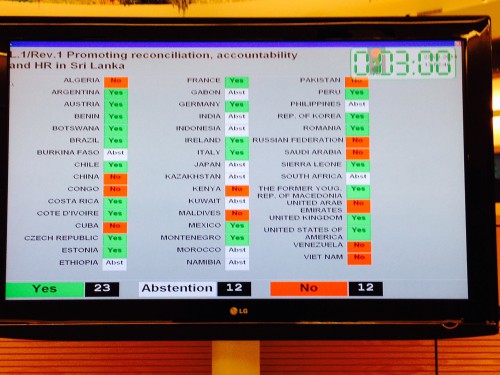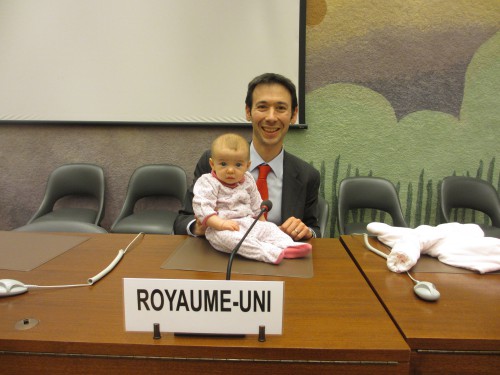31st March 2014 Geneva, Switzerland
Coming to the surface
It’s hard to convey quite what it’s like to go through a March Council session. The four-week experience is a prolonged assault on the mind, body and soul and while the end of the session is a cause for elation it also feels distinctly post-traumatic. The process of stress-decompression and re-entering normal life needs to be handled carefully, like surfacing from a deep sea dive or returning to earth after time in space. I’m not quite there yet.
It was a session which kept the spotlight firmly on the world’s worst human rights violators. The Council renewed the Commission of Inquiry on Syria with its strongest resolution yet, leaving no doubt about the strength of outrage that most of the world feels towards the Assad regime.
The resolution on North Korea significantly increased global pressure on the appalling human rights situation by recommending that the UN Security Council take up the matter and pursue accountability. The Council also maintained its monitoring on Iran and Burma by renewing the Special Rapporteurs for a further year and saw a strong condemnatory statement on South Sudan which paves the way for further action in June. There were plenty of other resolutions on important issues but I couldn’t follow them. My session has been all about Sri Lanka.
I was on paternity leave last November when I saw the Prime Minister announce that the UK would call on the Council to establish an international inquiry into allegations of war crimes unless Sri Lanka carried out a credible domestic process by March. There was clearly a lot of work coming my way. Since 2009, human rights groups both inside and outside Sri Lanka had been calling on the UN to look into the many allegations of serious violations by both the Government and the Tamil Tigers during the conflict, especially the reported deaths of tens of thousands of civilians during its final stages.
But an international investigation through the Council had always seemed impossible. Like the rest of the UN system, the Council had failed the people of Sri Lanka in 2009. Although the Council had held a special session, its resolution did not address the reports of war crimes. Instead it praised the Government’s victory over the Tamil Tigers and called for “non-interference” in Sri Lanka’s affairs. This will always be a stain on the reputation of the Council and a low point for many of us who were there.
The resolutions by the US at the Council over the last two years which called for Sri Lanka to take action itself were crucial for keeping the issue alive and showing that the international community wanted Sri Lanka to end impunity and move toward reconciliation. The call for a comprehensive investigation by the Office of the High Commissioner for Human Rights in this year’s resolution, led jointly by the United States, Montenegro, Macedonia, Mauritius and the UK, was never going to be easy to achieve.
Sri Lanka categorically rejected the resolution from the outset and defeating it had become the Government’s major foreign policy priority. It has threatened human rights activists in the country, especially those wanting to come to Geneva to give information about continuing human rights violations. Ruki Fernando and Father Praveen, two prominent human rights defenders who were arrested during the session, have thankfully been released following substantial international pressure, but there is genuine fear of reprisals for those brave enough to engage with the Council.

Thursday’s vote was gut-wrenchingly tense. On Sri Lanka’s behalf, Pakistan, with the help of Russia and Cuba tried to use a vexatious procedural argument, on spurious financial grounds, to prevent the Council from debating the resolution and called a ‘No Action Motion’. It was a shameful move that should have no place at the Council and was firmly rejected by most Council members. Pakistan then tried to delete the international investigation from the resolution, in a second unsuccessful vote, before calling a third vote on the resolution itself.
The resolution passed by 23 votes to 12 with 12 abstentions and Pakistan’s hat trick of defeats left them looking foolish. It was good to see Botswana join Benin, Cote D’Ivoire and Sierra Leone in a yes vote this year and the decisions by Kuwait, Indonesia and the Philippines to abstain after voting no last year showed their growing frustration with the Sri Lankan government’s lack of progress. India, who had voted yes for the last two years, and Japan showed a lack of regional leadership by abstaining.

Country resolutions at the Council are hard to achieve but winning votes on them should never be a cause for triumph. They should serve as a tribute to the memory of those whose deaths and suffering made the resolution necessary. In Sri Lanka’s case I hope the resolution can help the country to address its difficult past and move towards a genuine process of healing, reconciliation and justice.
Like many Council delegates I’ve been spending so much time with a few colleagues that they start to feel like a work family. Now the session has finished I’m looking forward to my impressive US counterpart Valerie comparing notes with my wife on my elephant-fisted typing and my creative approach to filing. The two of them have been keeping me going, though my wife’s key contribution to the success on Sri Lanka has been less visible.
My baby daughter has been the one who I’ve neglected most though and she’s been competing with Sri Lanka for my attention ever since she was born. She got so fed up by my prolonged absence that she decided to come and check out the competition and finally dropped in on me at the UN last week. She was amused by the name plates and microphones, but otherwise wasn’t sure how all these stern looking people rushing around in suits could compete with her big smiles and pink fluffy pyjamas.
